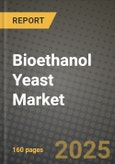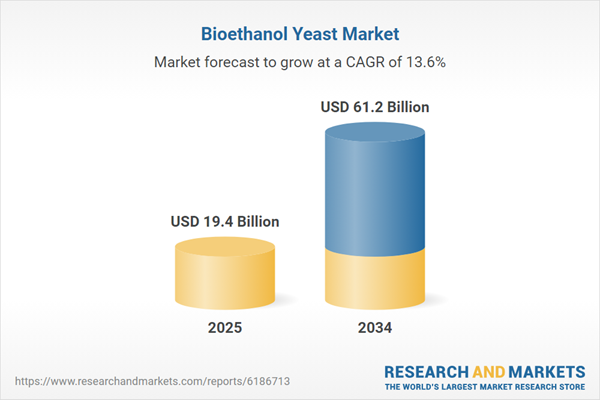The bioethanol yeast market plays a vital role in the global bioethanol production industry. Yeast, particularly strains of Saccharomyces cerevisiae, is a key microorganism used to ferment sugars derived from various biomass sources into ethanol. The selection of yeast strains has a significant impact on the efficiency, yield, and overall cost-effectiveness of bioethanol production. As the demand for renewable fuels continues to rise, yeast manufacturers and bioethanol producers are increasingly focused on optimizing yeast performance to enhance production economics, reduce waste, and improve sustainability.
Advancements in yeast strain development have been pivotal in driving growth in the bioethanol yeast market. Genetic engineering, adaptive evolution, and other modern biotechnological techniques have enabled the creation of yeast strains with enhanced tolerance to high ethanol concentrations, increased fermentation rates, and the ability to utilize a broader range of sugar substrates. For example, engineered yeasts that can ferment pentose sugars found in lignocellulosic biomass have opened up new opportunities for second-generation bioethanol production. These innovations not only improve the profitability of bioethanol plants but also reduce the environmental footprint of the industry by enabling more efficient use of renewable feedstocks.
Regionally, North America and Brazil dominate the bioethanol yeast market due to their well-established bioethanol industries and extensive agricultural feedstock resources. Europe, driven by stringent environmental regulations and renewable energy mandates, also represents a significant market for advanced yeast strains. The Asia-Pacific region is rapidly emerging as a growth area, with expanding bioethanol production capacities and increasing investments in modern fermentation technologies. As global efforts to reduce carbon emissions and reliance on fossil fuels intensify, the bioethanol yeast market is poised for continued innovation and growth, driven by advancements in biotechnology and the expanding demand for cleaner, renewable energy sources.
Key Insights: Bioethanol Yeast Market
- Increased adoption of genetically engineered yeast strains to improve ethanol yields and reduce production costs.
- Development of yeast strains capable of fermenting pentose and hexose sugars from lignocellulosic biomass.
- Growing focus on stress-tolerant yeast strains to enhance performance under challenging industrial fermentation conditions.
- Rising global demand for bioethanol as a renewable energy source.
- Advancements in yeast strain development through genetic engineering and adaptive evolution techniques.
- Supportive government policies and renewable fuel mandates in major bioethanol-producing regions.
- High development and production costs associated with next-generation yeast strains.
- Variability in feedstock composition and quality, requiring yeast strains with greater metabolic flexibility.
- Regulatory and public perception challenges related to the use of genetically modified organisms (GMOs) in fermentation.
Bioethanol Yeast Market Segmentation
By Type
- Yeast Extract
- Autolyzed Yeast
By Genus
- Saccharomyces
- Kluyveromyces
By Form
- Active
- Instant
- Fresh
By Application
- Food
- Animal Feed
- Biofuel
- Cleaning and Disinfection
- Other Applications
Key Companies Analysed
- Kagome Co. Ltd.
- Cargill Incorporated
- Archer-Daniels-Midland Company
- Associated British Foods plc
- Ohly
- Koninklijke DSM N.V
- Kerry Group plc
- POET LLC
- Groupe Soufflet
- Green Plains Inc.
- Lesaffre
- Novozymes A/S
- Angel Yeast Co. Ltd.
- Alltech
- Sensient Technologies Corporation
- ICC Brazil
- Lallemand Inc.
- Alto Ingredients
- Chr. Hansen A/S
- Leiber GmbH
- Corbion
- Kemin Industries Inc.
- Algol Chemicals
- Puratos Group
- LanzaTech
- BIORIGIN
- Algist Bruggeman NV
- Kothari Fermentation and Biochem Ltd.
- Omega Yeast Labs LLC
- Foodchem International Corporation
- AB Mauri
- Oriental Yeast Co. Ltd.
- Pacific Ethanol Inc.
- Fermentis (Société Industrielle Lesaffre)
Bioethanol Yeast Market Analytics
The report employs rigorous tools, including Porter’s Five Forces, value chain mapping, and scenario-based modeling, to assess supply-demand dynamics. Cross-sector influences from parent, derived, and substitute markets are evaluated to identify risks and opportunities. Trade and pricing analytics provide an up-to-date view of international flows, including leading exporters, importers, and regional price trends.Macroeconomic indicators, policy frameworks such as carbon pricing and energy security strategies, and evolving consumer behavior are considered in forecasting scenarios. Recent deal flows, partnerships, and technology innovations are incorporated to assess their impact on future market performance.
Bioethanol Yeast Market Competitive Intelligence
The competitive landscape is mapped through proprietary frameworks, profiling leading companies with details on business models, product portfolios, financial performance, and strategic initiatives. Key developments such as mergers & acquisitions, technology collaborations, investment inflows, and regional expansions are analyzed for their competitive impact. The report also identifies emerging players and innovative startups contributing to market disruption.Regional insights highlight the most promising investment destinations, regulatory landscapes, and evolving partnerships across energy and industrial corridors.
Countries Covered
- North America - Bioethanol Yeast market data and outlook to 2034
- United States
- Canada
- Mexico
- Europe - Bioethanol Yeast market data and outlook to 2034
- Germany
- United Kingdom
- France
- Italy
- Spain
- BeNeLux
- Russia
- Sweden
- Asia-Pacific - Bioethanol Yeast market data and outlook to 2034
- China
- Japan
- India
- South Korea
- Australia
- Indonesia
- Malaysia
- Vietnam
- Middle East and Africa - Bioethanol Yeast market data and outlook to 2034
- Saudi Arabia
- South Africa
- Iran
- UAE
- Egypt
- South and Central America - Bioethanol Yeast market data and outlook to 2034
- Brazil
- Argentina
- Chile
- Peru
Research Methodology
This study combines primary inputs from industry experts across the Bioethanol Yeast value chain with secondary data from associations, government publications, trade databases, and company disclosures. Proprietary modeling techniques, including data triangulation, statistical correlation, and scenario planning, are applied to deliver reliable market sizing and forecasting.Key Questions Addressed
- What is the current and forecast market size of the Bioethanol Yeast industry at global, regional, and country levels?
- Which types, applications, and technologies present the highest growth potential?
- How are supply chains adapting to geopolitical and economic shocks?
- What role do policy frameworks, trade flows, and sustainability targets play in shaping demand?
- Who are the leading players, and how are their strategies evolving in the face of global uncertainty?
- Which regional “hotspots” and customer segments will outpace the market, and what go-to-market and partnership models best support entry and expansion?
- Where are the most investable opportunities - across technology roadmaps, sustainability-linked innovation, and M&A - and what is the best segment to invest over the next 3-5 years?
Your Key Takeaways from the Bioethanol Yeast Market Report
- Global Bioethanol Yeast market size and growth projections (CAGR), 2024-2034
- Impact of Russia-Ukraine, Israel-Palestine, and Hamas conflicts on Bioethanol Yeast trade, costs, and supply chains
- Bioethanol Yeast market size, share, and outlook across 5 regions and 27 countries, 2023-2034
- Bioethanol Yeast market size, CAGR, and market share of key products, applications, and end-user verticals, 2023-2034
- Short- and long-term Bioethanol Yeast market trends, drivers, restraints, and opportunities
- Porter’s Five Forces analysis, technological developments, and Bioethanol Yeast supply chain analysis
- Bioethanol Yeast trade analysis, Bioethanol Yeast market price analysis, and Bioethanol Yeast supply/demand dynamics
- Profiles of 5 leading companies - overview, key strategies, financials, and products
- Latest Bioethanol Yeast market news and developments
Additional Support
With the purchase of this report, you will receive:- An updated PDF report and an MS Excel data workbook containing all market tables and figures for easy analysis.
- 7-day post-sale analyst support for clarifications and in-scope supplementary data, ensuring the deliverable aligns precisely with your requirements.
- Complimentary report update to incorporate the latest available data and the impact of recent market developments.
This product will be delivered within 1-3 business days.
Table of Contents
Companies Mentioned
- Kagome Co. Ltd.
- Cargill Incorporated
- Archer-Daniels-Midland Company
- Associated British Foods PLC
- Ohly
- Koninklijke DSM N.V
- Kerry Group PLC
- POET LLC
- Groupe Soufflet
- Green Plains Inc.
- Lesaffre
- Novozymes A/S
- Angel Yeast Co. Ltd.
- Alltech
- Sensient Technologies Corporation
- ICC Brazil
- Lallemand Inc.
- Alto Ingredients
- Chr. Hansen A/S
- Leiber GmbH
- Corbion
- Kemin Industries Inc.
- Algol Chemicals
- Puratos Group
- LanzaTech
- BIORIGIN
- Algist Bruggeman NV
- Kothari Fermentation and Biochem Ltd.
- Omega Yeast Labs LLC
- Foodchem International Corporation
- AB Mauri
- Oriental Yeast Co. Ltd.
- Pacific Ethanol Inc.
- Fermentis (Société Industrielle Lesaffre)
Table Information
| Report Attribute | Details |
|---|---|
| No. of Pages | 160 |
| Published | October 2025 |
| Forecast Period | 2025 - 2034 |
| Estimated Market Value ( USD | $ 19.4 Billion |
| Forecasted Market Value ( USD | $ 61.2 Billion |
| Compound Annual Growth Rate | 13.6% |
| Regions Covered | Global |
| No. of Companies Mentioned | 34 |









